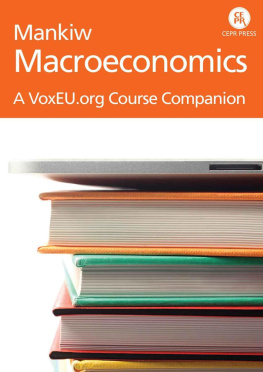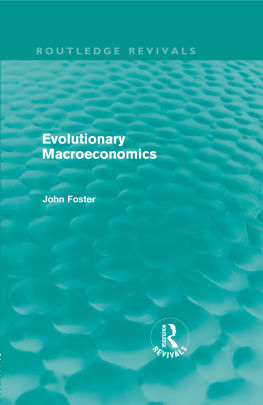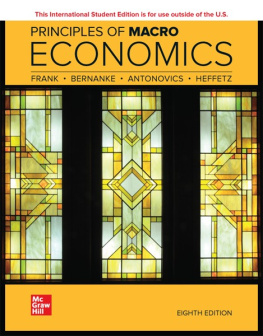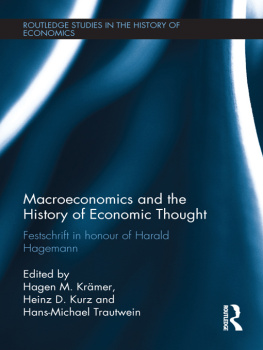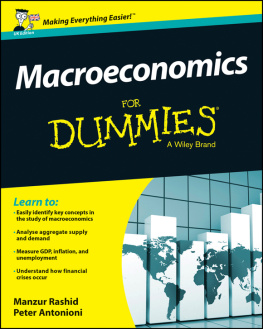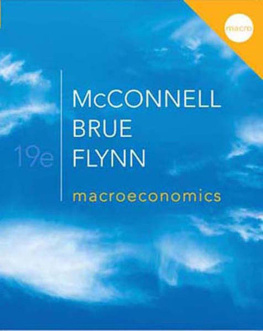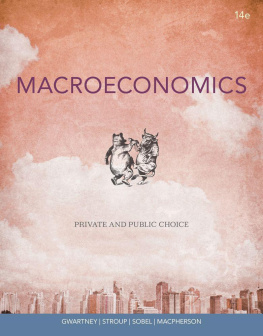Mankiw: Macroeconomics
A VoxEU Course Companion
Selected Vox columns from VoxEU.org

CEPR PRESS
Centre for Economic Policy Research (CEPR)
Centre for Economic Policy Research
3rd Floor
77 Bastwick Street
London, EC1V 3PZ
UK
Tel: +44 (0)20 7183 8801
Email: cepr@cepr.org
Web: www.cepr.org
2014 CEPR Press
ISBN: 978-1-907142-80-2
Centre for Economic Policy Research (CEPR)
The Centre for Economic Policy Research (CEPR) is a network of almost 900 research economists based mostly in European universities. The Centres goal is twofold: to promote world-class research, and to get the policy-relevant results into the hands of key decision-makers. CEPRs guiding principle is Research excellence with policy relevance. A registered charity since it was founded in 1983, CEPR is independent of all public and private interest groups. It takes no institutional stand on economic policy matters and its core funding comes from its Institutional Members and sales of publications. Because it draws on such a large network of researchers, its output reflects a broad spectrum of individual viewpoints as well as perspectives drawn from civil society.
CEPR research may include views on policy, but the Executive Committee of the Centre does not give prior review to its publications. The opinions expressed in this report are those of the authors and not those of CEPR.
Chair of the Board Guillermo de la Dehesa
President Richard Portes
Director Richard Baldwin
Research Director Kevin Hjortshj ORourke
Introduction
Richard Baldwin
Editor-in-Chief of VoxEU.org
August 2014
Economics can seem complex and mysterious to students who have just started studying the subject.
Even excellent textbooks like Greg Mankiws Macroeconomics.
Very often, the theory in the textbook remains abstract and one ponders how it applies to the economic and policy activity we observe in reality. Sometimes we recognise in the business and economics news certain terms and theories from our macroeconomic classes, while the complete concept and any policy implications remain incomprehensible.
This VoxEU Course Companion tries to bridge this gap, providing students with a collection of columns that accompany the chapters of their macroeconomic textbook by Mankiw. The columns were written by leading scholars in the field of economics and cover recent events and trends in the world of economics and policy analysis. As the columns are aimed at economists in the government and private sectors, as well as academics, they might not be immediately understandable by students who are just making their entrance into the world of economics. But as we know, Rome was not built in a day. It might take gradual exposure to the style and language of the columns for students to become fluent in the highly technical lingo. That is why we do not believe this book should be read all at once or understood all at once. It is meant to accompany a textbook and, just like a textbook, it should be read and grasped chapter by chapter. By the end, students will have mastered the way vague and abstract concepts of economic theory are applied in the real world, and will have learned to apply them themselves. In this way, their understanding of macroeconomics can be greatly enhanced.
The columns we have selected follow the chapters in Mankiws textbook on macroeconomics. Note that this is not a strict classification and many columns could be placed into more than one chapter, simply because economic concepts and theories are often intertwined and it is difficult to talk about one particular problem in isolation without touching upon a number of other issues. After two discussions of the science of macroeconomics, we offer some recent European insight on national income, followed by columns discussing the international monetary system. Then we have selected columns discussing recent inflation policies and the way economies influence each others inflation rates. We finish the part on classical theory with columns on trade, inequality, export growth, and on recent (especially youth) unemployment trends.
The next part starts by highlighting interesting country cases that offer examples of recent economic growth and proceeds with the contemporary drivers of this growth, most prominently technology.
A few chapters presenting the economy in the short run follow, with columns highlighting key macroeconomic theory and policy aspects. Some interesting columns here to mention just a few examples deal with a psychological explanation of investment in housing, the added value of the euro, the connection between the Great Depression and the current recession, the causes and consequences of the crisis in Europe, and, of course, columns discussing the future of macroeconomic policy.
Part I: Introduction
Chapter 1 The Science of Macroeconomics
The return of schools of thought in macroeconomics
Simon Wren-Lewis
University of Oxford
24 February 2012
Just five years ago, macroeconomists talked about a new synthesis, bringing together Keynesian and Classical ideas in a unified, microfounded theoretical framework. Following the Great Recession, it appears that mainstream macroeconomics has once again split into schools of thought. This column explains why macroeconomics, unlike microeconomics, periodically fragments in this way.
In the 1970s and 1980s, macroeconomics was all about schools of thought. A popular textbook (Snowdon et al 1994) had the title A Modern Guide to Macroeconomics: An Introduction to Competing Schools of Thought . Macroeconomists tended to take sides, and different schools had clear ideological associations. Antagonists often talked across each other, and anyone not already on one side just got totally confused. Schools of thought fragmented mainstream macroeconomics in a way that had no parallel in mainstream microeconomics.
But then things began to change. The discipline appeared to become much more unified. It would be going much too far to suggest that there was a general consensus, but to use a tired clich, most macroeconomists started talking the same language, even if they were not saying the same thing. Goodfriend and King (1997) coined the term New Neoclassical Synthesis. Other authors wrote along similar lines (eg Woodford 2009 and Arestis 2007).This synthesis did only apply to what is generally described as mainstream economics. Heterodox economists continued to organise in schools (for example neo-Marxists, post-Keynesians, and Austrians). The synthesis was reflected in masters-level textbooks (eg Romer 1996), which would typically begin by setting out a Ramsey-style model, then discuss real business cycle models, and finally move on to add sticky prices to get New Keynesian theory.
There were two main factors behind this synthesis. The first was microfoundations, ie deriving the components of macro models from standard optimisation applied to representative agents. This gave macroeconomics the potential to achieve the same degree of unity as microeconomics. The second was the development of New Keynesian theory, which allowed an analysis of aggregate demand within a microfounded framework, and which integrated ideas like rational expectations and consumption-smoothing into Keynesian analysis. All models were now dynamic stochastic general equilibrium models.
Following the Great Recession, things seem rather different. In popular discussion of macroeconomics, schools of thought in macro are definitely back. Bitter disputes have broken out between those advocating fiscal stimulus (Keynesians) and those against. (For just one example of such quarrelling, see DeLong 2012.) For those in freshwater departments like Chicago, the idea of an effective fiscal stimulus was something they thought had died with the rational expectations and New Classical revolutions. It must therefore have been something of a shock to see it being resurrected, and it is understandable that they might dismiss it as invoking long-discredited fairy tales. It looked as if 30 years of progress in the discipline was being ignored. Those advocating stimulus and deploring premature austerity, on the other hand, were understandably taken aback to find their analysis dismissed in this way. They thought they were using mainstream macroeconomic theory, not the partisan analysis of a Keynesian school of thought. In a recent Vox column, Jonathan Portes (Portes 2012) describes his puzzlement at being labelled Keynesian, when he thought he was following synthesis macroeconomics.
Next page
